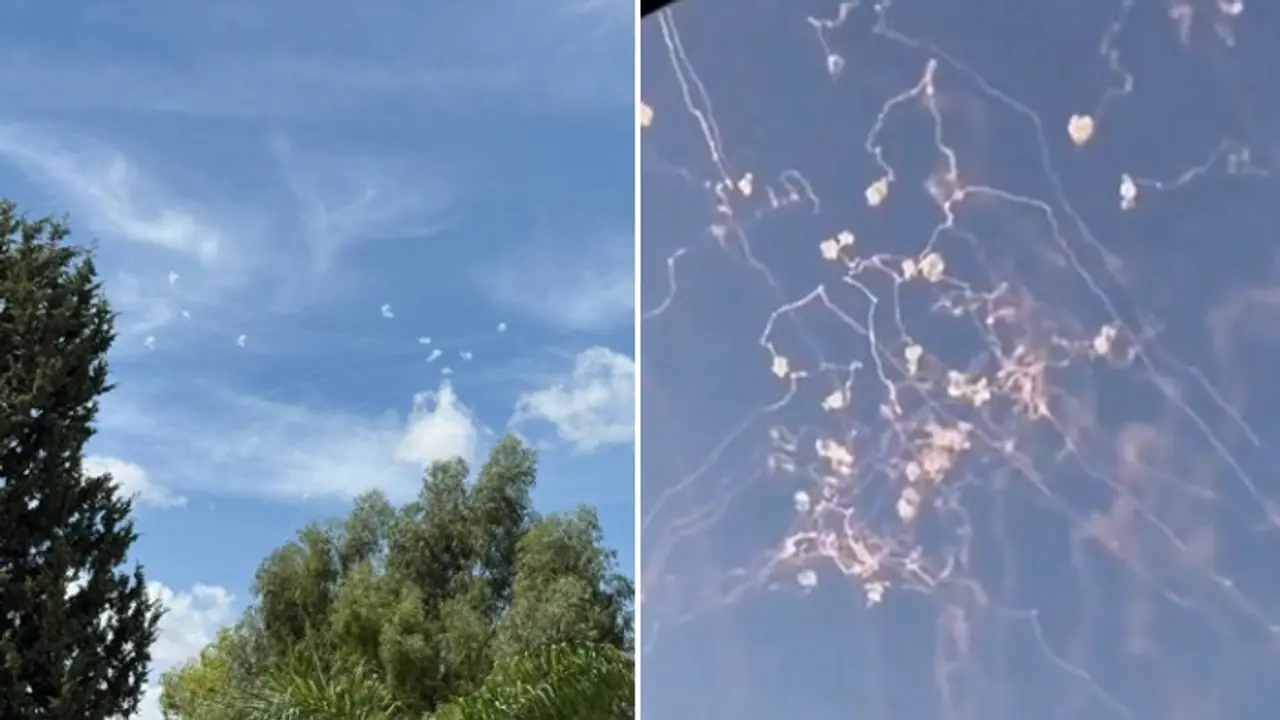Hezbollah launched a barrage of 140 rockets at northern Israel on Friday, following a vow by the group's leader, Hassan Nasrallah, to retaliate against Israel for a recent mass bombing attack.
Hezbollah launched a barrage of 140 rockets at northern Israel on Friday, following a vow by the group's leader, Hassan Nasrallah, to retaliate against Israel for a recent mass bombing attack. The Israeli military and Hezbollah confirmed the assault.

According to the Israeli military, the rocket attacks occurred in three waves during the afternoon, hitting various locations along the heavily damaged border with Lebanon.
In response, Israeli forces launched strikes across southern Lebanon, targeting Hezbollah infrastructure, though details on the extent of the damage were not provided.
Hezbollah claimed its rockets hit several sites along the border, including air defense bases and, for the first time, the headquarters of an Israeli armored brigade.
The Israeli military reported that 120 missiles were fired at the Golan Heights, Safed, and the Upper Galilee. Some were intercepted, while fire crews worked to control blazes ignited by falling debris in multiple areas.
Hezbollah claimed responsibility, stating that they had used Katyusha rockets to hit multiple targets, including air defense bases and, for the first time, the headquarters of an Israeli armored brigade. The group said the attacks were in direct retaliation for Israeli airstrikes on villages and civilian homes in southern Lebanon.
While Hezbollah and Israel have been exchanging regular fire since October 8, following the beginning of the Israel-Hamas war, Friday's rocket strikes were notably heavier than the typical exchanges.
The Israeli military did not specify whether any of the missiles hit targets or caused casualties. Another 20 rockets were fired at the areas of Meron and Netua, with most landing in open spaces, and no injuries were reported.
Hezbollah stated that the rocket strikes were in retaliation for Israeli air raids on southern Lebanese villages and homes, rather than the recent two-day attacks, widely attributed to Israel, that triggered explosions in thousands of Hezbollah pagers and walkie-talkies.
Since October 8, the day after the start of the Israel-Hamas conflict, Hezbollah and Israel have been engaged in near-daily exchanges of fire. However, Friday’s rocket salvos were notably heavier than usual. In a speech on Thursday, Nasrallah vowed to continue daily attacks on Israel despite the sabotage of his group's communication devices, which he called a "severe blow."
At least 20 people were killed, and thousands were wounded when pagers, walkie-talkies, and other devices exploded in Lebanon on Tuesday and Wednesday.
These sophisticated attacks have raised concerns that the ongoing cross-border exchanges could escalate into a full-scale war. Israel has neither confirmed nor denied involvement in these incidents.
In response, Israel has deployed a significant military force to its northern border, while officials have ramped up their rhetoric. The country’s security Cabinet has also set a key war objective of facilitating the return of tens of thousands of displaced residents to their homes in northern Israel.
Meanwhile, fighting in Gaza has slowed, but the death toll continues to climb. Overnight, Palestinian authorities reported that 15 people were killed in several Israeli airstrikes in the Gaza Strip.
Among the victims were six individuals, including children, in an early Friday morning airstrike on a family home in Gaza City, according to Gaza’s Civil Defense. Another person was killed when a strike hit a group of people on a street in Gaza City.
Israel maintains that it targets militants and accuses Hamas and other armed groups of putting civilians at risk by operating in residential areas. The Israeli military, which rarely comments on specific strikes, has yet to respond to these latest incidents.
Gaza's Health Ministry reports that more than 41,000 Palestinians have been killed since Hamas’ October 7 attack. The ministry does not distinguish between fighters and civilians in its count, but notes that just over half of the dead are women and children.
Israel, meanwhile, claims to have killed over 17,000 militants, though it has not provided evidence to support this figure.
Additionally, the Health Ministry states that more than 95,000 people have been wounded in Gaza since the conflict began.
The war has caused widespread destruction, displacing approximately 90% of Gaza's 2.3 million residents.
